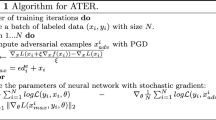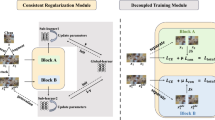Abstract
Adversarial robustness is critical for deep learning models to defend against adversarial attacks. Although adversarial training is considered to be one of the most effective ways to improve the model’s adversarial robustness, it usually yields models with lower natural accuracy. In this paper, we argue that, for the attackable examples, traditional adversarial training which utilizes a fixed size perturbation ball can create adversarial examples that deviate far away from the original class towards the target class. Thus, the model’s performance on the natural target class will drop drastically, which leads to the decline of natural accuracy. To this end, we propose the Data-Adaptive Adversarial Training (DAAT) which adaptively adjusts the perturbation ball to a proper size for each of the natural examples with the help of a natural trained calibration network. Besides, a dynamic training strategy empowers the DAAT models with impressive robustness while retaining remarkable natural accuracy. Based on a toy example, we theoretically prove the recession of the natural accuracy caused by adversarial training and show how the data-adaptive perturbation size helps the model resist it. Finally, empirical experiments on benchmark datasets demonstrate the significant improvement of DAAT models on natural accuracy compared with strong baselines.
Access this chapter
Tax calculation will be finalised at checkout
Purchases are for personal use only
Similar content being viewed by others
Notes
- 1.
- 2.
Experimental results with more network architectures are deferred to the Appendix.
References
Balaji, Y., Goldstein, T., Hoffman, J.: Instance adaptive adversarial training: improved accuracy tradeoffs in neural nets. arXiv preprint arXiv:1910.08051 (2019)
Bengio, Y., Louradour, J., Collobert, R., Weston, J.: Curriculum learning. In: Proceedings of the 26th Annual International Conference on Machine Learning, pp. 41–48 (2009)
Bojarski, M., et al.: End to end learning for self-driving cars. arXiv preprint arXiv:1604.07316 (2016)
Carlini, N., Wagner, D.: Adversarial examples are not easily detected: bypassing ten detection methods. In: Proceedings of the 10th ACM Workshop on Artificial Intelligence and Security, pp. 3–14 (2017)
Carlini, N., Wagner, D.: Towards evaluating the robustness of neural networks. In: 2017 IEEE Symposium on Security and Privacy (SP), pp. 39–57. IEEE (2017)
Collobert, R., Weston, J.: A unified architecture for natural language processing: Deep neural networks with multitask learning. In: Proceedings of the 25th International Conference on Machine Learning, pp. 160–167 (2008)
Croce, F., Hein, M.: Reliable evaluation of adversarial robustness with an ensemble of diverse parameter-free attacks. In: ICML (2020)
Feinman, R., Curtin, R.R., Shintre, S., Gardner, A.B.: Detecting adversarial samples from artifacts. arXiv preprint arXiv:1703.00410 (2017)
Goodfellow, I.J., Shlens, J., Szegedy, C.: Explaining and harnessing adversarial examples. arXiv preprint arXiv:1412.6572 (2014)
Grosse, K., Manoharan, P., Papernot, N., Backes, M., McDaniel, P.: On the (statistical) detection of adversarial examples. arXiv preprint arXiv:1702.06280 (2017)
He, K., Zhang, X., Ren, S., Sun, J.: Deep residual learning for image recognition. In: Proceedings of the IEEE Conference on Computer Vision and Pattern Recognition, pp. 770–778 (2016)
Hendrycks, D., Gimpel, K.: Early methods for detecting adversarial images. In: ICLR (2017)
Ilyas, A., Santurkar, S., Tsipras, D., Engstrom, L., Tran, B., Madry, A.: Adversarial examples are not bugs, they are features. In: NeurIPS, pp. 125–136 (2019)
Kannan, H., Kurakin, A., Goodfellow, I.: Adversarial logit pairing. arXiv preprint arXiv:1803.06373 (2018)
Kim, M., Tack, J., Hwang, S.J.: Adversarial self-supervised contrastive learning. Adv. Neural. Inf. Process. Syst. 33, 2983–2994 (2020)
Krizhevsky, A., Hinton, G., et al.: Learning multiple layers of features from tiny images (2009)
Kundu, S., Nazemi, M., Beerel, P.A., Pedram, M.: A tunable robust pruning framework through dynamic network rewiring of DNNs. arXiv preprint arXiv:2011.03083 (2020)
Li, X., Li, F.: Adversarial examples detection in deep networks with convolutional filter statistics. In: Proceedings of the IEEE International Conference on Computer Vision, pp. 5764–5772 (2017)
Liao, F., Liang, M., Dong, Y., Pang, T., Hu, X., Zhu, J.: Defense against adversarial attacks using high-level representation guided denoiser. In: Proceedings of the IEEE Conference on Computer Vision and Pattern Recognition, pp. 1778–1787 (2018)
Van der Maaten, L., Hinton, G.: Visualizing data using t-SNE. J. Mach. Learn. Res. 9(11) (2008)
Madry, A., Makelov, A., Schmidt, L., Tsipras, D., Vladu, A.: Towards deep learning models resistant to adversarial attacks. In: ICLR (2018)
Madry, A., Makelov, A., Schmidt, L., Tsipras, D., Vladu, A.: Towards deep learning models resistant to adversarial attacks. In: International Conference on Learning Representations (2018). https://openreview.net/forum?id=rJzIBfZAb
Mao, C., Zhong, Z., Yang, J., Vondrick, C., Ray, B.: Metric learning for adversarial robustness. Adv. Neural Inf. Process. Syst. 32 (2019)
Metzen, J.H., Genewein, T., Fischer, V., Bischoff, B.: On detecting adversarial perturbations. In: ICLR (2017)
Moosavi-Dezfooli, S.M., Fawzi, A., Uesato, J., Frossard, P.: Robustness via curvature regularization, and vice versa. In: Proceedings of the IEEE/CVF Conference on Computer Vision and Pattern Recognition, pp. 9078–9086 (2019)
Netzer, Y., Wang, T., Coates, A., Bissacco, A., Wu, B., Ng, A.Y.: Reading digits in natural images with unsupervised feature learning (2011)
Szegedy, C., et al.: Intriguing properties of neural networks. arXiv preprint arXiv:1312.6199 (2013)
Tramèr, F., Behrmann, J., Carlini, N., Papernot, N., Jacobsen, J.H.: Fundamental tradeoffs between invariance and sensitivity to adversarial perturbations. In: International Conference on Machine Learning, pp. 9561–9571. PMLR (2020)
Tsipras, D., Santurkar, S., Engstrom, L., Turner, A., Madry, A.: Robustness may be at odds with accuracy. In: International Conference on Learning Representations (2018)
Wang, Y., Zou, D., Yi, J., Bailey, J., Ma, X., Gu, Q.: Improving adversarial robustness requires revisiting misclassified examples. In: International Conference on Learning Representations (2019)
Xie, C., Wu, Y., Maaten, L.V.D., Yuille, A.L., He, K.: Feature denoising for improving adversarial robustness. In: Proceedings of the IEEE Conference on Computer Vision and Pattern Recognition, pp. 501–509 (2019)
Xu, W., Evans, D., Qi, Y.: Feature squeezing: detecting adversarial examples in deep neural networks. arXiv preprint arXiv:1704.01155 (2017)
Zagoruyko, S., Komodakis, N.: Wide residual networks. In: Wilson, R.C., Hancock, E.R., Smith, W.A.P. (eds.) Proceedings of the British Machine Vision Conference (BMVC), pp. 87.1–87.12. BMVA Press (2016). https://doi.org/10.5244/C.30.87
Zhang, H., Yu, Y., Jiao, J., Xing, E., El Ghaoui, L., Jordan, M.: Theoretically principled trade-off between robustness and accuracy. In: International Conference on Machine Learning, pp. 7472–7482. PMLR (2019)
Zhang, J., et al.: Attacks which do not kill training make adversarial learning stronger. In: International Conference on Machine Learning, pp. 11278–11287. PMLR (2020)
Zhang, J., Zhu, J., Niu, G., Han, B., Sugiyama, M., Kankanhalli, M.: Geometry-aware instance-reweighted adversarial training. In: International Conference on Learning Representations (2021). https://openreview.net/forum?id=iAX0l6Cz8ub
Acknowledgements
This work was supported in part by the Australian Research Council under Project DP210101859 and the University of Sydney Research Accelerator (SOAR) Prize.
Author information
Authors and Affiliations
Corresponding author
Editor information
Editors and Affiliations
1 Electronic supplementary material
Below is the link to the electronic supplementary material.
Rights and permissions
Copyright information
© 2022 The Author(s), under exclusive license to Springer Nature Switzerland AG
About this paper
Cite this paper
Yang, S., Xu, C. (2022). One Size Does NOT Fit All: Data-Adaptive Adversarial Training. In: Avidan, S., Brostow, G., Cissé, M., Farinella, G.M., Hassner, T. (eds) Computer Vision – ECCV 2022. ECCV 2022. Lecture Notes in Computer Science, vol 13665. Springer, Cham. https://doi.org/10.1007/978-3-031-20065-6_5
Download citation
DOI: https://doi.org/10.1007/978-3-031-20065-6_5
Published:
Publisher Name: Springer, Cham
Print ISBN: 978-3-031-20064-9
Online ISBN: 978-3-031-20065-6
eBook Packages: Computer ScienceComputer Science (R0)




